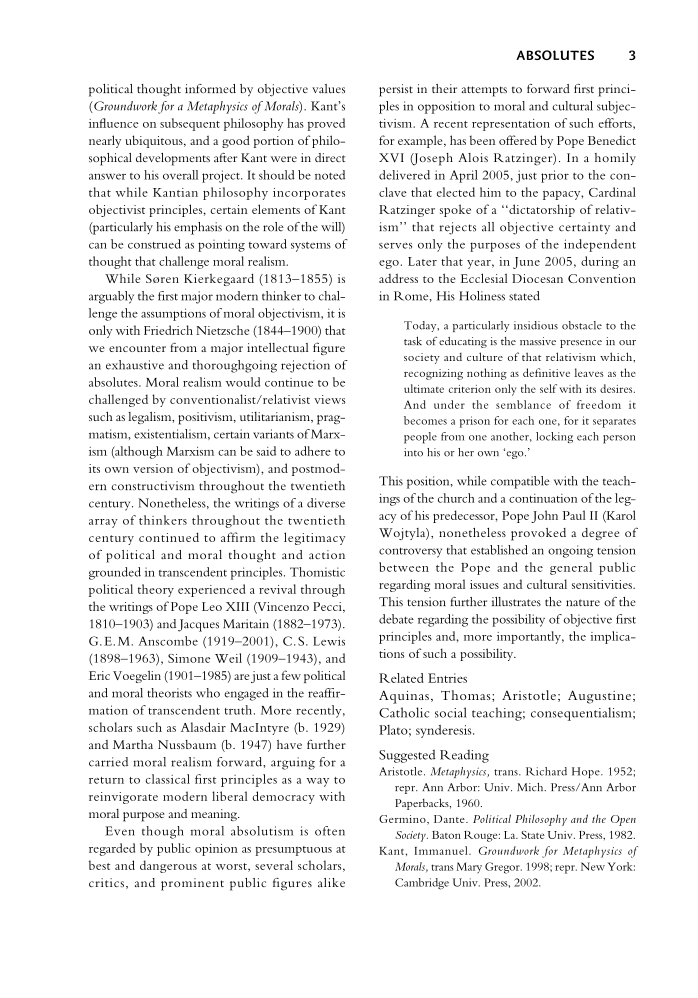political thought informed by objective values (Groundwork for a Metaphysics of Morals). Kant’s influence on subsequent philosophy has proved nearly ubiquitous, and a good portion of philo- sophical developments after Kant were in direct answer to his overall project. It should be noted that while Kantian philosophy incorporates objectivist principles, certain elements of Kant (particularly his emphasis on the role of the will) can be construed as pointing toward systems of thought that challenge moral realism. While Søren Kierkegaard (1813–1855) is arguably the first major modern thinker to chal- lenge the assumptions of moral objectivism, it is only with Friedrich Nietzsche (1844–1900) that we encounter from a major intellectual figure an exhaustive and thoroughgoing rejection of absolutes. Moral realism would continue to be challenged by conventionalist/relativist views such as legalism, positivism, utilitarianism, prag- matism, existentialism, certain variants of Marx- ism (although Marxism can be said to adhere to its own version of objectivism), and postmod- ern constructivism throughout the twentieth century. Nonetheless, the writings of a diverse array of thinkers throughout the twentieth century continued to affirm the legitimacy of political and moral thought and action grounded in transcendent principles. Thomistic political theory experienced a revival through the writings of Pope Leo XIII (Vincenzo Pecci, 1810–1903) and Jacques Maritain (1882–1973). G.E.M. Anscombe (1919–2001), C.S. Lewis (1898–1963), Simone Weil (1909–1943), and EricVoegelin(1901–1985)arejust a few political and moral theorists who engaged in the reaffir- mation of transcendent truth. More recently, scholars such as Alasdair MacIntyre (b. 1929) and Martha Nussbaum (b. 1947) have further carried moral realism forward, arguing for a return to classical first principles as a way to reinvigorate modern liberal democracy with moral purpose and meaning. Even though moral absolutism is often regarded by public opinion as presumptuous at best and dangerous at worst, several scholars, critics, and prominent public figures alike persist in their attempts to forward first princi- ples in opposition to moral and cultural subjec- tivism. A recent representation of such efforts, for example, has been offered by Pope Benedict XVI (Joseph Alois Ratzinger). In a homily delivered in April 2005, just prior to the con- clave that elected him to the papacy, Cardinal Ratzinger spoke of a ‘‘dictatorship of relativ- ism’’ that rejects all objective certainty and serves only the purposes of the independent ego. Later that year, in June 2005, during an address to the Ecclesial Diocesan Convention in Rome, His Holiness stated Today, a particularly insidious obstacle to the task of educating is the massive presence in our society and culture of that relativism which, recognizing nothing as definitive leaves as the ultimate criterion only the self with its desires. And under the semblance of freedom it becomes a prison for each one, for it separates people from one another, locking each person into his or her own ‘ego.’ This position, while compatible with the teach- ings of the church and a continuation of the leg- acy of his predecessor, Pope John Paul II (Karol Wojtyla), nonetheless provoked a degree of controversy that established an ongoing tension between the Pope and the general public regarding moral issues and cultural sensitivities. This tension further illustrates the nature of the debate regarding the possibility of objective first principles and, more importantly, the implica- tions of such a possibility. Related Entries Aquinas, Thomas Aristotle Augustine Catholic social teaching consequentialism Plato synderesis. Suggested Reading Aristotle. Metaphysics, trans. Richard Hope. 1952 repr. Ann Arbor: Univ. Mich. Press/Ann Arbor Paperbacks, 1960. Germino, Dante. Political Philosophy and the Open Society. Baton Rouge: La. State Univ. Press, 1982. Kant, Immanuel. Groundwork for Metaphysics of Morals, trans Mary Gregor. 1998 repr. New York: Cambridge Univ. Press, 2002. ABSOLUTES 3
Document Details My Account Print multiple pages
Print
You have printed 0 times in the last 24 hours.
Your print count will reset on at .
You may print 0 more time(s) before then.
You may print a maximum of 0 pages at a time.

























































































































































































































































































































































































